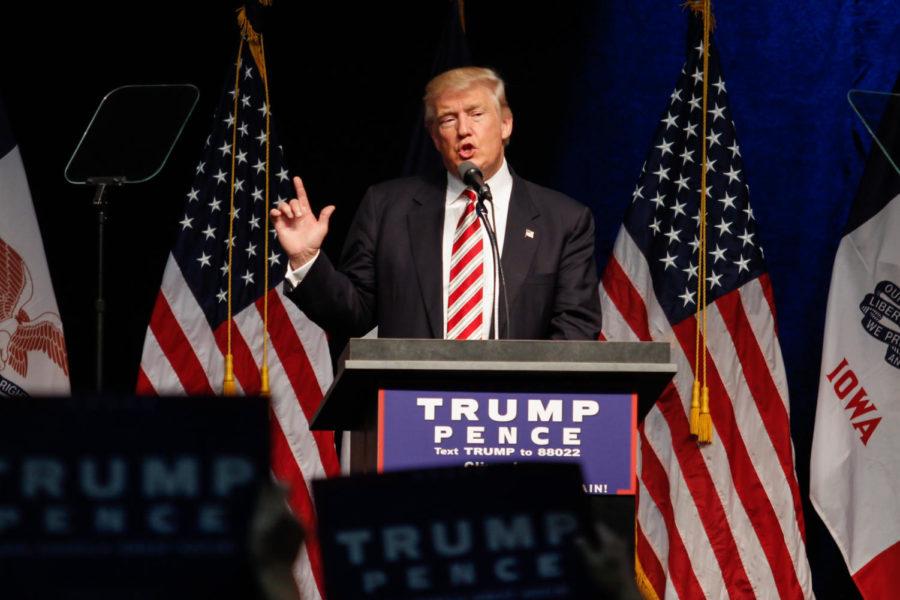- App Content
- App Content / News
- News
- News / Nation
- News / Politics And Administration
- News / Politics And Administration / Campus
- News / Politics And Administration / State
- News / Student Life
ISU College Republicans and Democrats respond to Trump’s Helsinki remarks
Now-President Donald Trump speaks to the crowd about then-Democratic presidential nominee Hillary Clinton’s emails on Sep. 13, 2016 in Clive, Iowa.
July 17, 2018
President Donald Trump met with members of the media on Tuesday to discuss the events that transpired on his trip to Europe.
The main focus of the meeting was Trump’s statements in Helsinki, Finland, after his meeting with Russian President Vladimir Putin in which he said he believed Putin’s denials of Russian interference in the 2016 United States presidential election.
Trump said after reading a transcript and watching video of his statements in Finland, he felt they warranted clarification.
“The sentence should have been: ‘I don’t see any reason why it wouldn’t be Russia,'” he said. “Sort of a double negative.”
He said he accepted the intelligence agencies’ conclusion that Russia interfered but said others may have interfered as well. Trump reiterated there had been no collusion between Russia and his campaign.
Trump did say he had “great faith and support in America’s intelligence agencies,” saying that he always has.
“Unfortunately the press conference in Helsinki has taken the focus away from the success that was made before Finland,” said Taylor Collins, former Iowa State student and Chairperson for the Iowa Federation of College Republicans. “So first and foremost, I’d like to acknowledge the significance of the meeting between NATO leaders.
“The President won a major victory in getting other members of the alliance to agree to contribute their two percent of GDP toward defense. With an increasingly aggressive Russia, it’s very important that member nations contribute to the security of Eastern Europe and the rest of the continent.”
Collins added that he was initially upset with Trump’s statements but was relieved when he offered a clarification. Collins said he would take him at his word that he misspoke.
Ashton Ayers-Ingle, political director for Iowa State University College Democrats, did not believe Trump’s correction to be truthful.
“I don’t think the president was sincere in his correction,” Ayers-Ingle said. “The president has always prided himself in his ability to speak off-the-cuff. That is why he mocked a disabled reporter, why he tells people in his crowds to beat up reporters and calls women degrading things. He speaks from his gut a lot of the time.
“We should take him for his word. When he was standing there in that meeting next to Vladimir Putin it was clear he was putting his personal loyalties in Vladimir Putin over the American people.”
His original remarks drew sharp backlash from both sides of the aisle, with John McCain, R-AZ, calling it “one of the most disgraceful performances by an American president in memory.”
Senate Majority Leader Mitch McConnell, R-KY, spoke to reporters before Trump addressed the media and sent a message to European allies.
“I want them to understand that in this country, there are a lot of people in both parties who believe that these alliances painstakingly built in the wake of the end of World War II are important and we want to maintain them,” McConnell said.
He also issued a warning to Russia.
“The Russians need to know that there are a lot of us who fully understand what happened in 2016, and it really better not happen again in 2018,” McConnell said.
Ayers-Ingle was happy to see republicans voicing critical opinions of Trump’s comments in Finland, but surprised this instance was enough to spark such criticism.
“It is amazing to me that President Trump banned Muslims from the country; caged children and separated them from their parents at the border; he has attacked the free press and admitted on tape to sexually assaulting women,” Ayers-Ingle said. “It is these actions that have caused republicans to draw the line, so I appreciate some of them now seeing the light, but I am amazed it has taken them this long.”
Despite criticism from both sides of the aisle, Collins said he felt positively about Trump’s ability to improve relations with Russia, drawing a historic comparison.
“Some disagree that he shouldn’t have met with him, but I think him engaging with Putin directly could be just as effective as Reagan engaging with Gorbachev,” Collins said.
Devyn Leeson contributed reporting to this article.







